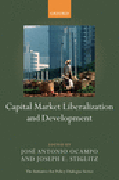
Capital market liberalization and development
Stiglitz, Joseph E.
Ocampo, José Antonio
Written by leading academics and policymakers with varying viewpoints of the debate. Provides an analysis of the risks associated with Capital Market Liberalization and examines the alternative forms of capital market intervention. Highly topical, controversial and accessibly written. Capital market liberalization has been a key battle in the debate on globalization for much of the previous two decades. Many developing countries, often at the behest of international financial institutions such as the IMF, opened their capital accounts and liberalized their domestic financial markets as part of the wave of liberalization that characterized the 1980s and 1990s and in doing so exposed their economies to increased risk and volatility. Now with even the IMF acknowledging the risks inherent in capital market liberalization, the central intellectual battle over the effects of capital market liberalization has for the most part ended. Though this new understanding of the consequences of capital market liberalization is reshaping many policy discussions among academics and international institutions, ideological and vested interests remain. Critical policy debates also remain, such as how much government should intervene and what tools are available. Although capital market liberalization might not produce the promised benefits, many economists and policymakers still worry about the costs of intervention. Do these costs exceed the benefits? What are the best kinds of interventions, under what circumstances? To answer these questions, we have to understand why capital market liberalization has failed to enhance growth, why it has resulted in greater instability, why the poor appear to have borne the greatest burden, and why the advocates of capital market liberalization were so wrong. Bringing together some of the leading researchers and practitioners in the field, this volume provides an analysis of both the risks associatedwith capital market liberalization and the alternative policy options available to enhance macroeconomic management. INDICE: 1. Capital Account Liberalization and Development , José Antonio Ocampo, Shari Spiegel, and Joseph E. Stiglitz. 2. The Benefits and Risks of Financial Globalization , Sergio L. Schmukler. 3. Capital Market Liberalization, Globalization, and the IMF , Joseph E. Stiglitz. 4. From the Boom in Capital Inflows to Financial Traps , Roberto Frenkel. 5. Poverty and Inequality , Andrew Charlton. 6. Capital Management Techniques in Developing Countries: ManagingCapital Flows in Malaysia, India, and China , K. S. Jomo, Gerald Epstein, Ilene Grabel. 7. Role of Preventative Capital Account Regulation , José Antonio Ocampo and Gabriel Palma. 8. The Malaysian Experience in Financial-Economic Crisis Management: An Alternative to the IMF-style approach , Martin Khor. 9. Domestic Financial Regulations in Developing Countries , Liliana Rojas-Suarez. 10. The Pro-Cyclical Impact of Basle II on Emerging Markets , Stephany Griffith-Jones and Avinash Persaud. 11. Derivatives and CML , Randall Dodd. 12. Codes and Standards , Benu Schneider
- ISBN: 978-0-19-923844-6
- Editorial: Oxford University
- Encuadernacion: Rústica
- Páginas: 384
- Fecha Publicación: 01/05/2008
- Nº Volúmenes: 1
- Idioma: Inglés
